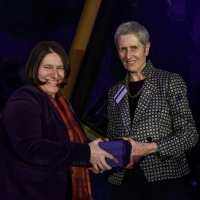
Twenty of Australia’s best and brightest health and medical researchers were honoured at the National Health and Medical Research Council’s (NHMRC) annual Research Excellence Awards in Canberra last week. Dr Jo McKenzie, a Senior Research Fellow and biostatistician based at Monash University and contributor to Cochrane Australia was among the recipients of the prestigious awards recognising recent outstanding performance in their fields.
‘Every scientist honoured this evening has presented the highest quality research application for their grant category as determined by independent expert review panels.’ NHMRC CEO Professor Anne Kelso said. ‘Considering the NHMRC received over 5,400 applications last year, these are truly great achievements.’
Jo took out the prize for the top Career Development Fellowship in Population Health Level 1 in recognition of her exceptional contributions to the development and evaluation of research methods for randomised trials and systematic reviews. ‘I’ve always had an enthusiasm for maths and statistics and the ways they can be used to investigate and improve human health,’ Jo says. ‘I’m especially interested statistical methods that are used to combine numerical data about the effects of treatments, a method known as meta-analysis, and how meta-analysis results inform the conclusions of systematic reviews.’
‘Systematic reviews bring together research on the benefits and harms of healthcare treatments and are used every day - by patients, clinicians and policymakers – as the basis for decisions on health care testing, treatments and funding. They are a critical part of the research landscape.’
The statistical methods used in systematic reviews underpin the findings and conclusions of that research, but there’s often little evidence to guide the actual choice of methods when designing and analysing a study. This is where Jo’s work comes in. ‘Methods matter because applying different methods to the same data can result in different conclusions – harmful treatments could be adopted or effective treatments could be missed. So the study of methods is a critical part of science that helps us identify and use optimal methods. Ultimately this provides us with confidence in research findings which is essential for patients, clinicians, policymakers and other researchers.’
‘Unfortunately, in Australia, there are limited funding avenues for this essential type of research,’ Jo says. ‘So I’m incredibly honoured to receive this award, given it recognises the importance of biostatistics to health research and systematic reviews for health decision-making.’
'The methods research I’ve undertaken and led has contributed to improving the design, analysis and reporting of RCTs and systematic reviews,’ Jo says. ‘I hope my work will continue to improve the evidence on which healthcare decisions are based through research that advances methods for systematic reviews. An integral part of this will be the development of an evidence-based methods system that provides researchers with accessible and trustworthy evidence on which to base their choice of methods.’
Image courtesy of the NHMRC
